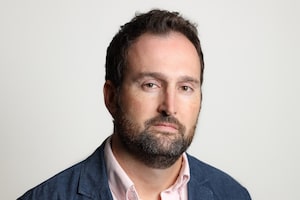Ben Perryman, representing the BC Civil Liberties Association and the East Coast Prison Justice Society, addresses the Mass Casualty Commission inquiry into the mass murders in rural Nova Scotia on April 18/19, 2020, in Truro, N.S. on Sept. 23.Andrew Vaughan/The Canadian Press
The final day of public hearings in the Nova Scotia mass shooting inquiry ended with a demand for more accountability from the RCMP, and a promise from the probe’s commissioners to make meaningful recommendations to prevent future tragedies.
At the end of a week of closing statements, Ben Perryman, a law professor speaking for the BC Civil Liberties Association, told the inquiry the national police force has been unwilling to accept responsibility for mistakes in its response to the April 2020 rampage, which left 22 people dead. He accused the Mounties of obstructing efforts to get to the truth, in part by delaying the release of critical documents. Many of the RCMP’s failures during the manhunt for the killer could not be blamed on a lack of resources, he said.
“The RCMP has not behaved as a neighbour or a community member that’s committed to public safety,” added Mr. Perryman, who also represents the East Coast Prison Justice Society.
Commissioner Brenda Lucki says there have been no RCMP reforms since N.S. mass shooting
Lessons were learned from Nova Scotia mass shooting, RCMP deputy commissioner says
Nova Scotia public inquiry hears from officer who interviewed perpetrator of mass shooting
“They have repeatedly engaged in exercises of avoiding accountability. If they continue this behaviour after your report is published, they are likely to be a serious barrier to implementation.”
The inquiry, which began public hearings in February, interviewed more than 230 people, including 80 RCMP officers, and subpoenaed tens of thousands of documents as part of its investigation. It will deliver a final report by the end of March that will include recommendations that many hope will improve police training and preparedness for similar mass casualty events.
“This has been a hard journey for the families, for participants, and for everyone involved,” said commissioner Michael MacDonald, chair of the inquiry, which is known as the Mass Casualty Commission. “We now have a solid basis upon which to make meaningful, achievable recommendations.”
Lori Ward, general counsel for the federal Department of Justice, said the RCMP’s response to the 2020 shooting rampage was far from perfect, but she insisted police had done their best. She acknowledged that there is always room for improvement in all policing agencies.
“No response to a critical incident of this magnitude could be perfect, but when this crisis hit the RCMP showed up, did their best and acted with courage, determination and dedication,” Ms. Ward said.
It’s difficult, she added, to separate what was known when the killer was at large on April 18 and 19, 2020, from what has been uncovered in the years since the tragedy. While hindsight is a valuable tool, she said, it “can also impede a fair and objective evaluation of decisions made in real time.”
On the night of April 18, 2020, a man disguised as a Mountie and driving a car that looked exactly like an RCMP cruiser started killing neighbours and strangers in rural Portapique, N.S.
Ms. Ward said she is aware of the criticism levelled at the RCMP for allegedly dismissing witness accounts of the marked police car the gunman was driving. She said that during the shootings the idea that the killer could have built such a car himself was beyond reasonable comprehension.
When the RCMP were sent photos of gunman Gabriel Wortman’s replica police cruiser on the second morning of the rampage, the vehicle was initially viewed with “disbelief and incomprehension” by the force’s members, Ms. Ward said.
“To assert that they should have continued to search for a car identical to their own, as opposed to turning their minds to alternatives like decommissioned cars, is to view the events through the lens of someone who has now been familiar with the existence of the replica car for more than two years,” she said.
Ms. Ward, who at times during her closing statement had tears in her eyes, noted that among the RCMP’s “problems and failings” in the aftermath of the shootings was a delay in discovering some of the killer’s victims.
Harry and Cory Bond, the sons of Peter and Joy Bond – a couple murdered in Portapique the night of April 18, 2020 – started hearing from acquaintances the next morning about shootings near Cobequid Court, the road where their parents lived.
A summary from the inquiry says it was about 18 hours after the killings started before an RCMP officer found the Bonds’ bodies inside their home.
“The anguish felt by the families of those victims at the thought of that lapse of time is unimaginable,” Ms. Ward said.
She said this delay is among the things “RCMP wishes it could go back and change.”
Nasha Nijhawan, a lawyer representing the RCMP’s union, the National Police Federation, told the inquiry that improving officer safety must be a priority for the commission. One Mountie, Constable Heidi Stevenson, was killed by the gunman, while another was shot during the manhunt.
She said improvements are needed to RCMP equipment, training and staffing levels in rural areas to improve the Mounties’ ability to respond to these kinds of events. Ms. Nijhawan acknowledged that increasing police funding is a contentious issue, but she urged the commissioners to be “practical and balanced” in their recommendations for RCMP resources.
“Our members’ safety cannot be further compromised. We are already running short. We are already risking it out,” she said. “Your recommendations must not make this worse for our members.”
With a report from The Canadian Press
 Greg Mercer
Greg Mercer